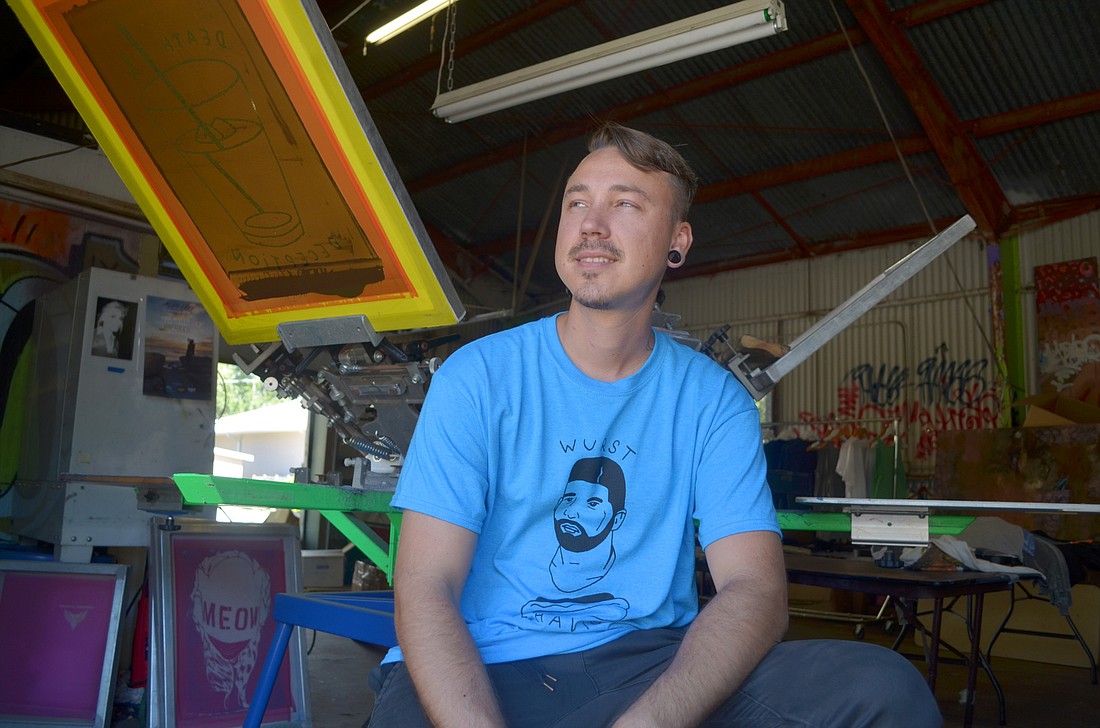- November 24, 2024
-
-
Loading

Loading

In the back corner of his Burns Court retail store, Austin Kowal sat hunched over his desk, sketching a T-shirt idea for his new urban street-wear company, Clothesline Tees.
An older woman came in from the street and stopped to survey the recently opened shop and gallery space. On display were a handful of Kowal’s edgy, screen-printed shirts, works from a recent pop-up show and brightly graffitied walls.
Unable to see Kowal from behind his desk, the woman made her opinion clear.
“Oh my gosh,” she said, before turning to leave the store. “How awful!”
Despite the blunt critique, Kowal wasn’t upset. In fact, he couldn’t have been happier.
“That was the most amazing thing,” he says. “It was so out of the realm of anything she had seen in town. She couldn’t believe there was something like this in Sarasota. To me, that was awesome. It drove me to keep doing what I was doing.”
Now, seven years later, Clothesline has earned a dedicated following and established itself as an ambassador for Sarasota’s young creatives.
A Sarasota native, Kowal, 30, grew up immersed in the local arts scene. His parents were both antique dealers, and he remembers accompanying them to auctions and estate sales and helping out on the showroom floor of their shop.
Although he couldn’t relate to most of the art he saw, he says he gained an appreciation for the arts and the level of talent that existed locally.
But it wasn’t long before he noticed a lack of art with which younger people could connect. And the few things he could relate to were fleeting.
“Things would come and go,” he says. “But young creative people here tend to not stick around very long.”
Although he never considered himself an artist, Kowal says he always pursued creative endeavors — especially drawing. And in 2008, he and a group of friends started sketching T-shirt ideas and printing them with a homemade screen-printing machine. Despite their inexperience, Kowal says he realized they were onto something.
“We were all amateurs,” he says. “But we had a little bit of skill, and we had some interesting ideas. What resulted were these very basic designs, but they were really different than anything we’d seen out in public. I think our lack of artistic skills actually helped us create something fresh.”
Over the next few years, as he continued to produce apparel, Kowal developed his skills as an illustrator and printer, as well as an audience who was hungry for something new.
Collaborating with fellow artists and photographers, Kowal created shirts, posters, hats and bags — anything that could be screen-printed. He wanted to promote a style of art he felt was underrepresented.
“I really like the idea of seeing someone wearing my shirt. That became intoxicating."
He rented a warehouse space northeast of downtown, upgraded to professional printing equipment and secured a network of clients. The more he created, the more his perspective shifted.
“I was constantly creating things,” he says. “Over time, I refined my process and grew my skills. It gave me more direction. It was really the first time I started to think of myself as an artist.”
He wasn’t the only one. His work resonated with Sarasota’s younger art-lovers. Local bands and businesses came to him to have T-shirts and posters made; he secured jobs live-printing apparel at special events, like Ringling Underground and Shamrock Pub’s annual St. Patrick’s Day party; and his shop became a hub for creativity, as he hosted increasingly popular social events, printing parties and pop-up shows.
Kowal says he grew to love his art form — especially its capacity to mass-produce and distribute his art to the public.
“I really like the idea of seeing someone wearing my shirt,” he says. “My friends would call me and tell me they saw someone out in a Clothesline shirt. That became intoxicating. Knowing that people were out there who liked something you created enough to wear it — that was awesome to me.”
Today, Kowal works exclusively out of his warehouse production space, which he says has allowed him to go back to his roots and focus on the finer details of printing and running his business.
He hopes to one day open another retail space, but for now, he says he’s happy where he is, and he hopes his work will inspire other young artists to stay in town.
“Having something they can relate to is important,” he says. “Especially in a town where there’s not a lot of that going on. This started as a hobby for me and my friends, and it’s evolved into a business that now supports me. I want people to see it’s possible to do what you love.”